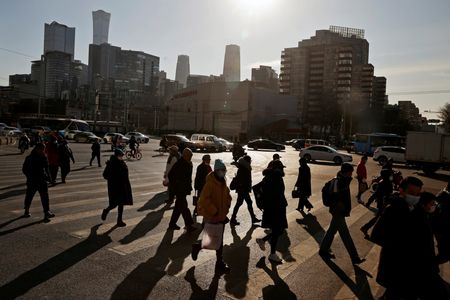By Kevin Yao
BEIJING (Reuters) – An unexpectedly weak run of Chinese economic data this month has raised the heat on policymakers to deliver more stimulus measures, but it also shows the limited effect more monetary easing and infrastructure spending can have.
Signs of weakness are emerging from across the economy: exports fell; inflation slowed; new bank lending tumbled. And all despite the authorities bucking the global trend so far this year and deploying monetary and fiscal easing this year.
GRAPHIC: China’s exports and imports contract in October – https://graphics.reuters.com/GLOBAL-MARKETS/jnpwygodbpw/chart.png
Analysts say the weak data may increase pressure on policymakers to deliver even more stimulus – JPMorgan and Goldman Sachs analysts said in research notes on Friday they expected a 25 basis point rate cut in coming weeks.
But the latest figures also suggest that the stimulus would not have the desired impact as long as domestic and external demand remain subdued, especially as China pursues a policy of eradicating COVID-19 outbreaks as soon as they occur.
“Much weaker than expected credit growth … underlines the difficulties policymakers are facing stimulating growth while activity is suppressed by zero-COVID,” said Mark Williams, chief Asia Economist at Capital Economics.
China is on track to miss its annual growth target of around 5.5% – the latest Reuters poll forecast 2022 growth at 3.2%.
Exports fell unexpectedly in October for the first time since May 2020. Chinese manufacturers, which dominate global trade, had already failed to get the typical pre-Christmas surge during the summer. Now, the usual year-end shipment surge that comes as overseas clients front-load orders before the Lunar New Year break in January-February is also in doubt.
A nearly 12% drop in the yuan against the dollar so far this year could not prevent exports from contracting.
With high inflation and rising borrowing costs in China’s main export markets, and domestic demand crippled by tough COVID restrictions, it is hard to see where demand for credit could come from even if rates are cut.
The burst of China’s enormous property market bubble – which accounted for a fifth of economic activity at its peak – also keeps both home buyers and banks reluctant to re-engage in transactions.
Data on Thursday showed new bank lending in China fell more than expected in October from the previous month while broad credit growth slowed.
“The fourth quarter is usually a quiet time for loans and credits, but this set of data for October is just too soft,” said Iris Pang, chief economist for Greater China at ING.
“Together with (manufacturing) and trade data, we believe that there could be a deeper-than-expected slowdown during the month.”
SINGLES DAY
Consumers remain low on confidence, according to a key barometer of Chinese retail demand. The Singles Day shopping festival, which despite its name has evolved into a multi-week event, is estimated to have been subdued.
Chinese consultancy Syntun estimates Alibaba Group Holding and other Chinese e-commerce firms holding Singles Day shopping events together logged a 4.7% decline in sales for the first half of the final day.
Underscoring the weakness in domestic demand, factory gate prices for October dropped for the first time since December 2020. Consumer price inflation came at 2.1%, down from September’s 2.8%.
GRAPHIC: China’s October PPI turns negative – https://graphics.reuters.com/CHINA-ECONOMY/INFLATION/dwvkdgwklpm/chart.png
The onus is increasingly on fiscal policy. Chinese authorities are doubling down on an infrastructure push, issuing debt to fund big public works projects to revive the economy.
Local media reported that Chinese authorities have allowed local governments to frontload part of their 2023 special bond quotas for such projects.
But the main near-term headwind remains China’s zero-COVID policy, while the longer term drag remains domestic demand.
China on Friday incrementally eased some of its COVID rules, raising hopes that more significant measures may be in the pipeline.
“COVID curbs have greatly affected consumption and investment,” said Wang Jun, director at China Chief Economist Forum. “As COVID restrictions become more targeted and looser, the pressure on consumption could ease.”
(Reporting by Kevin Yao; Editing by Marius Zaharia and Tomasz Janowski)

